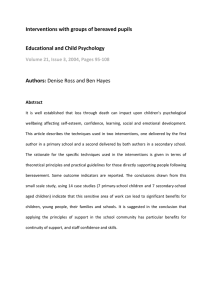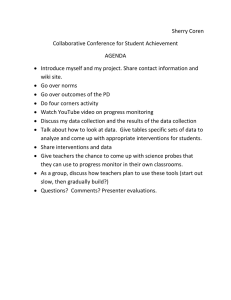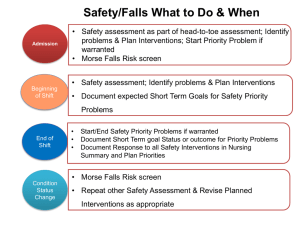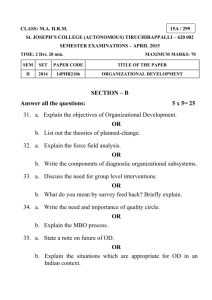Chapter Twelve: Interpersonal and Group Process Approaches Organization Development and Change
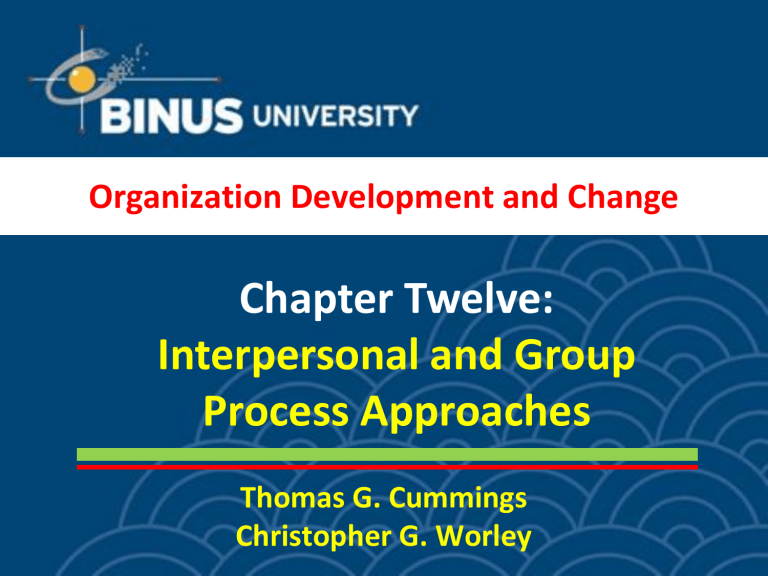
Organization Development and Change
Chapter Twelve:
Interpersonal and Group
Process Approaches
Thomas G. Cummings
Christopher G. Worley
Learning Objectives for Chapter Twelve
To understand the human process interventions aimed at interpersonal relations and group dynamics
To understand the application and effectiveness of various process interventions in producing
change
12-2
Process Interventions
A set of activities on the part of the consultant that helps group members understand, diagnose, and improve their behaviors.
Interventions are aimed at helping the group become better able to use its own resources to identify and solve interpersonal problems and devise more effective ways of working.
12-3
Process Consultation
Definitions
The creation of a relationship that permits the client to perceive, understand, and act on the process events…”
An approach that helps people and groups help themselves
Group Process Issues Addressed by Process
Consultation
Communications
The functional roles of group members
Group problem solving and decision making
Group norms
Leadership and authority 12-4
Basic Process Interventions
Individual Interventions
Aimed at helping people better communicate with others
Johari Window
Group Interventions
Aimed at the process, content or structure of the group
12-5
Johari Window
Unknown to Others Known to Others
Hidden
Spot
Open
Window
Known to
Self
Unknown
Window
Blind
Spot
Unknown to Self
12-6
Improving Communications Using the Johari Window
Unknown to Others Known to Others
Reduce
Hidden Area through
Disclosure to
Others
Open
Window
Known to
Self
Reduce Blind Spot through Feedback from
Others
Unknown to Self
12-7
Third Party Interventions
Activities that focus on interpersonal conflicts within the organization
Interventions help involved parties interact with each other directly, facilitating diagnosis of the conflict and its resolution
12-8
A Cyclical Model of Conflict
Triggering
Event
Issues
Behavior Triggering
Event
Consequences
Issues
Behavior
Consequences
Episode 1 Episode 2
12-9
Strategies for Conflict Resolution
Prevent the conflict through mandate or separation of the parties
Set limits on the timing and extent of the conflict
Help the parties to cope differently with the conflict
Attempt to eliminate or resolve the basic issues in the conflict
12-10
Team Building Activities
Activities Related to One or More Individuals
Activities Oriented to the Group’s Operations and Behaviors
Activities Affecting the Group’s Relationship with the Rest of the Organization
12-11
Types of Teams
Groups reporting to the same manager
Groups involving people with common goals
Temporary groups formed to accomplish a specific, one-time task
Groups consisting of people whose work roles are interdependent
Groups with no formal links but whose collective purpose requires coordination
12-12
Team-Building Activities
Determine the Intervention Target
One or more individuals
A group’s operation and behavior
A group’s relationships with the rest of the organization
Determine the Intervention Orientation
Diagnostic
Developmental
12-13
Team Building Activities
Group Operation and Behavior
An inward look by the team at its own performance, behavior and culture for the purpose of improving effectiveness
Group Relationships with the Organization
Understand the group’s role within the organization including interaction, support, and collaboration
Manager’s Role
12-14
2-15


